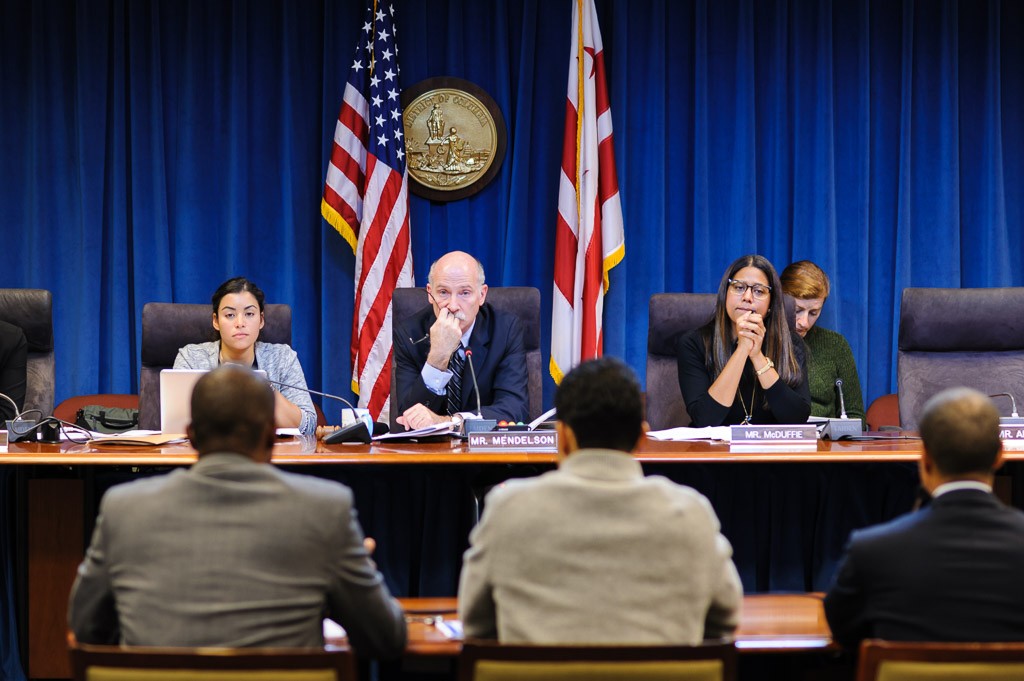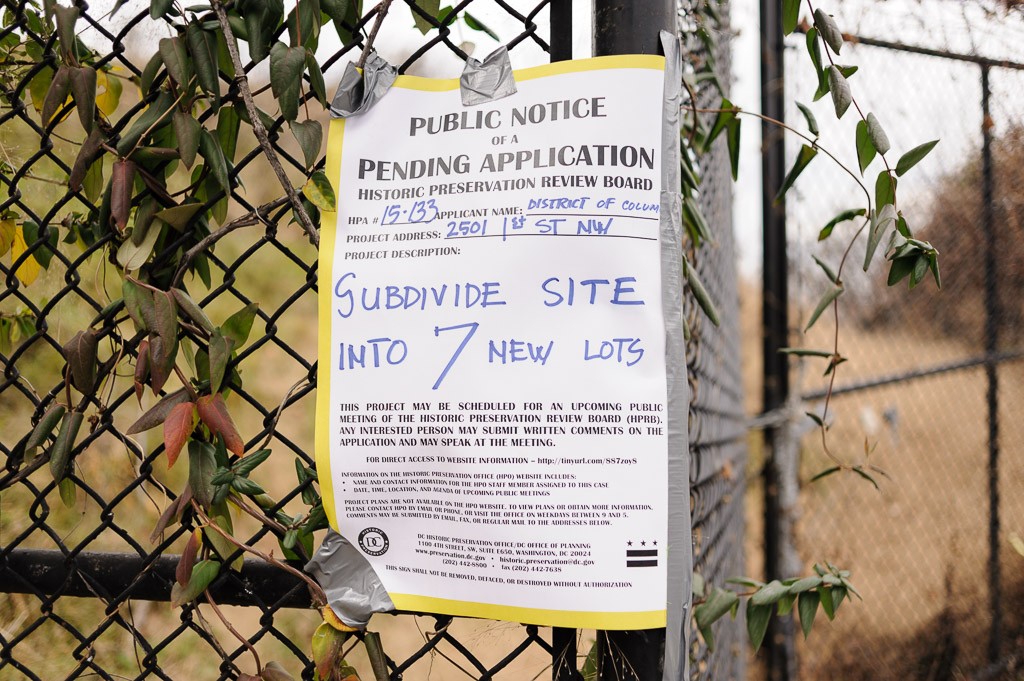
But Why?
By Jeffrey Anderson. Photographs by Andy DelGiudice
With more than 15 years on the D.C. Council, four of them at the helm, Chairman Phil Mendelson is known as perhaps the city’s most knowledgeable legislator on the subject of land use and real estate development.
So his frustration resonated when he spoke in February to several dozen members of the Committee of 100 on the Federal City, of which he is a trustee, and blamed District planning officials for negotiating poor development deals for the city because of executive turnover and staff inexperience. Committee members took his remarks also as a rebuke of a revolving door culture within the business and political community, yet questioned his ability if not willingness to do anything about it.
The District is on its fourth mayor in a decade that has seen rapid growth, corruption and acrimony over increasing social and economic disparities attributed to gentrification. Officials in charge of the District’s real estate portfolio have come and gone, and come back again, allowing a perpetual and interchanging developer-lobbyist-legal establishment to capitalize on inconsistent city leadership through insider relationships, critics contend.
Citizens and entire communities feel out of the loop.
But the council has failed in its oversight role, its critics say, sometimes to the point of appearing complicit in what appear to be shady deals. “Phil knows there are outrageous giveaways but he just doesn’t have the votes,” says Committee of 100 member Anne Sellin, who has known Mendelson for close to three decades. “The council has degenerated enormously, and I think he feels defeated.”
A Sweetheart Deal
In September, Mendelson wrote to Deputy Mayor for Planning and Economic Development Brian Kenner and urged him to extract a better deal on behalf of District residents, on a real estate project at 965 Florida Avenue N.W., a 10-story apartment building to be anchored by a Whole Foods Market. Independent appraisals show the proposed sale, at $400,000, to be more than $5 million below real property value. Such was the disparity that Mendelson complained publicly about lack of transparency and took it upon himself to haggle over an affordable housing component and a profit sharing arrangement, an ad hoc intervention more properly the domain of the mayor’s office — not the council chair. He then scheduled a vote by the council, which, pro forma, approved the deal.
Members of the Committee of 100, which advocates for responsible land use and historic preservation, agree with Mendelson that the executive should be more transparent. But they are disappointed that he doesn’t seem to be demanding that transparency. Competing developers and political observers are more cynical: They smell a sweetheart deal preserved by cozy relationships and a lack of council oversight.
In 2013, a proposal for the Florida Avenue property by JBG Companies included a Harris Teeter supermarket and plans to incorporate an adjacent parcel that JBG controlled. The proposal gained community support and met terms of the solicitation, Washington City Paper reported. But when JBG lost out to MidAtlantic Realty Partners, observers were astounded.
Then-Deputy Mayor Victor Hoskins oversaw the award, causing some in the industry to grumble about an appearance of conflict, given that Hoskins’ wife, Diane Hoskins, is co-CEO of Gensler, a design firm that counts MRP as a major client, on deals such as Washington Gateway, Washington Harbour, Tysons Overlook, 900 G Street and a facade replacement at 1333-1343 H Street, Northeast.
MRP’s relationship with David Jannerone, an ally and fundraiser for Mayor Muriel Bowser, adds to the perception that ties to a sitting mayor or top official is an influential factor in private-public partnerships. When a firm walks away with a deal of questionable value to the District, that perception is magnified.
Jannerone is a former development manager under Bowser’s mentor, Adrian Fenty, and a former interim chief operation officer with the D.C. Department of Housing and Community Development. As a managing partner at Taylor Adams, a development and advisory firm, the value he brings to developers can be difficult to assess. In addition to the Florida Avenue project, MRP already is converting D.C. Housing Authority’s headquarters on North Capitol Street into housing, building a mixed-use project at Rhode Island Center, working on the Southwest Waterfront redevelopment, and developing a $43 million mixed-use project east of the Anacostia River with the housing and community development department. Jannerone is directly involved with at least two of those deals. He declined to comment for this story, citing contract confidentiality.
Committee of 100 members at the February meeting with Mendelson left with the impression that the city’s dealmaking culture bothers him. “I could see some venom in Phil, thinking that inexperienced D.C. project managers is a big part of the problem,” says committee member Kirby Vining, who is retired from the Foreign Service and a Ward 5 activist. “But he was cagey, distant,” Vining said, pointing to a remark by Mendelson about reluctance to expend political capital. “I also heard words that admitted he’s aware there’s a revolving door. Obviously [the mayor’s office] isn’t too interested in fixing that.”
Public Conversations
Mendelson has chaired the council since 2012. After three members of the scandal-ridden D.C. Council pleaded guilty to corruption charges in recent years, and the ward-based patronage system was laid bare, in 2015 he took oversight responsibility for planning and economic development and placed it under the Committee of the Whole, which includes all 13 council members, and which he controls.
Even though he occasionally uses his authority to limit influence on city government, conflict seems to vex him. Mendelson recounted for the Committee of 100 his frustration with Bowser’s persistent nomination of developer David Franco to the District’s zoning commission. Despite Mendelson’s refusal to hold a confirmation hearing, on grounds that Franco is too tied to the development community to sit on what is supposed to be a neutral body like the zoning commission, Bowser recently re-nominated Franco, with a letter, circulated by Ward 2 Council Member Jack Evans, signed by a majority of the council. “So, this is what I’m up against,” Mendelson told the group.
Despite attempts to bully him, Mendelson is holding his ground. But Bowser is not going away. She recently put Franco on a panel of “a public conversation” entitled “Preserving and Planning for Progress,” and last week she re-submitted his nomination.
That “public conversation” has been fueled by a real estate boom that has defied The Great Recession. With so much revenue, growth and profit at stake, the District has come to resemble a swollen udder, with builders and developers elbowing their way to a teat. D.C. watchdog and activist Dorothy Brizill says even in leaner times mayors used deputy mayors to push pet projects and reward friends, but it’s up to the council to represent the public’s interest. She says the council is rudderless, and that Mendelson is not running it in a competent manner. His gripes to the Committee of 100 annoy her. “The council exists to pass laws and conduct oversight,” Brizill says, “and the oversight is not happening. The council is not doing its job. Phil can rant and rave after the fact but what has he done?”
Case Study
An ill-fated bid to develop a mixed-use project on the Tenley-Friendship Library and adjacent Janney Elementary School sites from a decade ago could just as easily take place today.
A report based on public documents by a Ward 3 Advisory Neighborhood Commission states that in January 2007, Jannerone, then D.C.’s director of development, strategized with his former firm, Roadside Development, on how to get Mayor Fenty to authorize the library project. In July that year, Jannerone urged his boss, Fenty’s deputy mayor, to issue a request for proposal and bypass the council to designate the land as surplus, the report states. By the time the neighborhood commission was clued in, the solicitation was in play and Roadside had the inside edge.
The neighborhood commission accused the deputy mayor’s office of pre-empting its authority and failing to disclose details of the project in time for public review and comment. “Basically, [the office] has created a situation in which it solicits offers, keeps the details private, revises the [solicitation] after seeing who has proposed what, and then selectively informs respondents of the new requirements and deadlines for meeting them,” states the report.
Jannerone did not notify his supervisor of his apparent conflict of interest until August, and even after he did, he continued to manage the project, according to the report. “[Jannerone’s] conflict of interest has tainted the entire process,” the report states, “leading to the issuance of an RFP at the behest of an ex‐employer, rather than on the basis of an objective analysis of whether private development on this site serves the public interest.”
The neighborhood commission was outraged by the lack of government analysis or public discussion about revenue projections, public facilities needs or the economic benefit of the project. “These questions have been left to developers rather than the Council to answer,” states the report, which details how another former planning and development official had become a vice president of Roadside, and how the deputy mayor’s office rolled out a request for proposal after the deal had essentially been put together.
Roadside’s bid eventually fell apart, but not before the neighborhood commission ripped the Fenty administration: “[The deputy mayor’s office’s] approach to decision‐making about public lands has been unconstrained by law, by any consistent standards, or by procedural safeguards,” the report states.
The commission’s report did not spare the council either: “We offer this case study as an example to use in thinking through the necessary and appropriate role of Council oversight in the disposition of public lands…The whole Council needs to be involved in these decisions from the beginning, because only the Council can provide the appropriate counterweight to [the deputy mayor’s office]…The Council has a duty to the people of this city to ensure that the public interest ‐‐ rather than the private interests of developers and individuals in government ‐‐ is being served when public lands are sold or leased for private use.”
Who Minds the Store
These days, Mendelson conducts council oversight of public land use by his lonesome, a solitary figure on the dais, quibbling on the margins of one project or another. In taking oversight duties into the Committee of the Whole, he has, in essence, made everyone responsible and no one accountable.
Unabated by vigorous oversight, the real estate boom has generated questions about value and public benefit that persist today. Meg McGuire, of the Committee of 100, says planning has become subservient to economic development, and that, “we’re not getting quality planning by a long shot.”
McGuire declined to address specifics of the February meeting, and stressed that she is a fan of Mendelson. But she pointed to structural aspects in D.C. government that make it easier for insider relationships to affect the outcome of development deals and zoning approvals. “The Office of Planning is buried under [the deputy mayor for planning and economic development] so guess who they answer to?” says McGuire. “We don’t have a truly independent planning [agency] and it leaves us open to dealmaking that can be a detriment to the city,” she says. “It seems we are dealing with an insider culture where decisions get made well before the public process is initiated. It’s tough for ordinary citizens to penetrate that. By the time the council sees a deal it’s way down the line.”
Projects years in the making can appear unseemly. In February 2012, Eric Jenkins, a senior economic development official who was managing the mixed re-use plan for Walter Reed Army Medical Center under Mayor Vincent Gray, was let go, City Paper reported. By September that year, he had joined the law firm of Graves, Horton, Askew & Johns, LLC, as head of the firm’s real estate and business practices. A year later, a joint venture between Hines Interests, Urban Atlantic and Triden Development, a client of Jenkins’ law firm, was selected as the master developer at Walter Reed. Then-Deputy Mayor Victor Hoskins denied that Jenkins’ participation was a factor in the contract award.
The Walter Reed award stunned local developers who say that an equally well-known developer had community support and a signed commitment by Wegmans Food Markets to anchor the 3-million-square-foot development. “Everyone assumed it was a wrap, but they come out of the backroom and it’s like, ‘what the fuck,'” says a developer who was not involved with the deal. Mendelson’s oversight of the matter, however, was limited to sniffing out and cutting $1 million in excess costs to the city.
Richard Lake, whose firm lost the bid, says he still doesn’t know what went wrong. “We had 700,000 square feet of [tenants] signed,” he says. “To this day, I have no idea why [the city] chose to go elsewhere.” Lake is careful not to sound like a complainer, and he has positive things to say about past and present deputy mayors — and Mendelson. But he points out that D.C. government lacks continuity of experience where it counts. “They need to find a way to allow experienced people to continue to serve,” he says. “These days real estate deals last longer than most administrations.”
As administrations come and go, they look to put their own stamp on projects initiated by previous mayors. Once Bowser took control of Walter Reed, Jenkins was in the position of having managed the deal for the city, then working for the law firm that advised the winning bidder. Sources familiar with the deal say Jenkins has complained about his cut arising from other aspects of his involvement. He did not return a call for comment. His law partner, Earle “Chico” Horton III, treasurer of Bowser’s defunct FreshPAC, describes himself to District Dig as nothing more than a “good old-fashioned lawyer,” and denies any further involvement in the Walter Reed deal.
Bowser did not dispel the significance of developer influence when she addressed the Commercial Real Estate Women, D.C. Chapter, last month. Bowser spoke about “reevaluating” decisions by the Gray administration towards the end of his term and pledged to solicit input from industry professionals. Indeed, Bowser’s “top-down review” of the city’s real estate portfolio has either put a hold on or completely gutted projects negotiated by Gray, including the adaptive re-use of the historic Franklin School. Bowser’s deputy mayor, Brian Kenner, did not respond to questions for this article.
IN-CROWD
Ralph Chittams, Senior Vice Chairman of the D.C. Republican Party, says that any city with one-party rule for any significant length of time, regardless of whether it is Republican or Democratic, is going to suffer from cronyism and corruption. “Power tends to corrupt; Absolute power corrupts absolutely,” he says, quoting 19th century moralist and historian John Emerich Edward Dalberg Acton.
Chittams places no specific blame on one administration to the next. He sees the transition from Fenty to Gray, and Gray to Bowser, in similar terms. “If you are part of the in-crowd, then the spigot is open, and cash flows,” he says. “If you’re not, you cry lack of accountability. Then when you’re the new guy who’s in power, everyone looks at you and cries no accountability.” Chittams has seen enough of Bowser and her in-crowd, however, to offer this assessment: “They live inside an echo chamber. There can be no dissent, there will be no dissent, and if there is dissent, you will be shown the door.”
Perhaps one of the most controversial projects to demonstrate how the “in-crowd” operates is the McMillan Sand Filtration Site, where the deputy mayor’s office and a consortium of companies are planning to build a 2 million square-foot mixed-use project on the 25-acre site, an engineering and design marvel where the city cleansed its drinking water for most of the 20th century.
The development plan at McMillan originally called for open bids to select a master developer, city documents show. But in 2007, Fenty dissolved the National Capital Revitalization Corporation, a public-private entity that oversaw that plan, and swept the city’s entire real estate portfolio into the deputy mayor’s office. Instead of issuing a solicitation, Fenty’s deputy mayor, Neil Albert, selected a consortium of firms that included a company owned by a close friend and fellow Harvard University alum, Jair Lynch. When Albert moved on to become Fenty’s city administrator, his replacement gave the consortium exclusive rights to purchase the land and develop it. (Neighborhood activists have challenged the project at every administrative level and have cases before the D.C. Court of Appeals.)
After Gray defeated Fenty, in 2010, Jeff Miller, a former executive at Trammell Crow, one of the firms in the consortium, oversaw the deal as the city’s director of real estate. Albert had left the government, but he too re-surfaced as a senior policy adviser to Holland & Knight, the law firm that represents the consortium on land use issues at McMillan. Albert left the firm in September.
In an arrangement that calls for the District to absorb pre-development costs of the project, Holland & Knight has billed the city more than $930,000 in pre-development legal fees to date.
Miller and Albert are just two former officials who walked through the revolving door. Former project manager on McMillan, Shiv Newaldess, went from the deputy mayor’s office to the Menkiti Group, a firm whose president, Bo Menkiti, housed campaign headquarters for Ward 5 Council Member Kenyan McDuffie, a staunch supporter of the McMillan project, which is in his ward. McDuffie’s former legislative director, Stephanie Liotta-Atkinson, also works for Menkiti.
Mendelson has opposed the McMillan deal in writing and criticized it at council oversight hearings. Yet in meetings of the Committee of the Whole he listens, often alone, to troubling aspects of the deal, then makes excuses such as “that ship has sailed.” Citywide mulishness over McMillan peaked last year when D.C. Auditor Kathy Patterson, in a letter to Mendelson, recommended conducting a new solicitation. Yet the council — and Mendelson — ignored Patterson’s guidance, and approved the sale of the property, with just one member, At-Large Council Member Elissa Silverman, voting against it.
Pre-development costs to the city alone are close to $9 million dollars, with a groundbreaking nowhere in sight.
Mary Pat Rowan opposes the McMillan deal, and she also sits on the Committee of 100. In an email to The Dig, she writes: “I’ve realized that Phil is no longer the person to admonish the executive agencies for favoring developers. He had to be aware that developers were moving in and out of [the mayor’s office] not just causing confusion and bad deals for the city, but actually getting great deals for the development companies that they came from or went to. He made no attempt to condemn this. This expresses clearly the disappointment we in the community have begun to feel.”
All photos by Andy DelGiudice
Update: In an email received after posting this story, a spokesman for the Deputy Mayor of Planning and Economic Development says that D.C. Council Chairman Phil Mendelson’s appraisal of the property at 965 Florida Avenue N.W. erroneously inflates its value. In response to Mendelson’s claim that the deputy mayor negotiates bad deals for the city, the spokesman says D.C. has economically thrived in recent years and has not submitted any projects that the council has disapproved or rejected. The deputy mayor currently oversees just one of MRP Realty’s projects with the city, says the spokesman, and he does not concern himself with who is or is not close with the mayor with regard to mayoral appointments. The deputy mayor has no position on the mayor’s nominee to the Zoning Commission.









